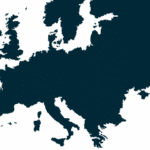ÁMBITO EUROPEO

El confinamiento ha acelerado la digitalización y en unos meses ha avanzado más que en muchos años
The lockdown has sped up the digital transformation, with greater progress in a few months than in many years
NO HAY VUELTA ATRÁS
Tengo un amigo que dice que va camino de convertirse en un viejo hippie. En realidad, mi amigo – que es de derechas, aunque bastante heterodoxo – no es nada contestatario, más bien lo contrario. Yo diría, incluso, que es el prototipo del burgués: atildado, urbanita, consumista, con estudios superiores y una situación económica privilegiada; o sea, lo más parecido a un yuppie que a un hippie. Si algo lo conecta con los jóvenes libertarios de los años 60 es su devoción por Janis Joplin, Grateful Dead o Jefferson Airplane y, sobre todo, su preocupación por el medio ambiente.
Lo que le pasa a mi amigo es que aborrece las nuevas tecnologías porque, asegura, no les saca rendimiento y considera que el peaje que paga por utilizarlas no le arrienda la ganancia debido a los riesgos. Escribe en ordenadores sin conexión a internet, utiliza móviles vintage y no está en ninguna red social ni en grupos de mensajería instantánea. Lo que quiere, cuando sea mayor que ahora, es volver al campo – a “lo esencial”, dice -, a vivir rodeado de gallinas y donde no lo controlen el Gobierno ni las multinacionales.
Yo, que soy bastante tecnófilo, entendí lo que quiere decir cuando a la salida de un restaurante en Huelva, hace un par de años, la aplicación de Google Maps del teléfono me pidió que evaluase el establecimiento. Comprobé entonces que, además de registrar aquella visita y otras similares en días anteriores, la aplicación de marras había seguido mi rastro por media España e incluso había anotado las paradas y su duración. Sin saberlo, hemos perdido privacidad, aparte de la que sacrificamos voluntariamente, y la cuestión a dilucidar, creo, es si compensa.
En dos décadas hemos dado un salto tecnológico de tal magnitud que no se explica linealmente, ni siquiera mediante una curva exponencial. Basándose en cálculos matemáticos, Ray Kurzweil, director de ingeniería de Google, pronostica que los cambios en los próximos años serán tan rápidos y profundos que habrá una evolución semejante a la de veinte mil años. Es más, predice que hacia 2045 nuestros cerebros podrán conectarse inalámbricamente con dispositivos externos (exocórtex) que multiplicarán su capacidad por mil millones.
La posibilidad de que dentro de veinte años estemos en el inicio de una especie de seres omniscientes escapa a nuestro entendimiento, aún bastante analógico, y es comprensible que, con fundamento o sin él, suscite recelos. Al fin y al cabo, es como jugar a ser Dios. En todo caso, como Abraracúrcix, el jefe galo que teme que el cielo le caiga sobre la cabeza, yo me consuelo pensando que “eso no pasará mañana”. Entretanto, lo que está claro es que ya vivimos entre dos mundos, uno que va camino de desaparecer y otro que está a la vuelta de la esquina.
De lo poco positivo que hemos sacado de la pandemia de COVID19 es que, siquiera por necesidad, nos hemos acercado a esa esquina. El confinamiento ha acelerado la digitalización y en unos meses ha avanzado más que en muchos años. En efecto, las empresas han tenido que ponerse las pilas, se ha extendido el teletrabajo, la educación se ha adaptado al entorno virtual, han crecido las compras online, utilizamos más la banca digital y ha aumentado el uso de las redes sociales.
Pero también han quedado patentes muchas carencias que sitúan a España en un puesto intermedio entre los países europeos. Especialmente preocupante es la situación de las pymes, que son el 99 % del tejido empresarial. Según la Radiografía de la PYME 2018, antes de la pandemia sólo el 19 % de ellas tenían un plan digital y únicamente el 3 % consideraban la digitalización una prioridad. La situación ha cambiado algo, pero los avances son aún insuficientes y no prosperan al mismo ritmo que crecen los desafíos.
Consciente de esas carencias en toda Europa y de que es un peligro depender de tecnologías y soluciones de países terceros o almacenar en sus “nubes” datos sensibles, la Unión Europea ha diseñado el programa Europa Digital, cuyo objetivo es, precisamente, remediar las insuficiencias y fortalecer las capacidades digitales de Europa. Paralelamente, nuestro Gobierno ha creado un plan para digitalizar las administraciones públicas, uno de los ejes de la Agenda España Digital 2025, que la patronal del sector considera muy positivo.
El apoyo de los empresarios no es inopinado: además de automatizar procesos, aprovechar las potencialidades de la inteligencia artificial para desarrollar productos o responder mejor a las necesidades de los clientes, saben que la digitalización de sus empresas no tiene sentido si no progresa la implantación de la Administración electrónica. Parece obvio, también, que esa transformación sólo tendrá éxito si es el remate a una profunda reforma de las anquilosadas estructuras de la Administración. Pero ese es otro cantar.
La cuestión sustancial, pienso, es persuadir a mi amigo de que el asunto no se nos va a ir de las manos y, por ejemplo, la inteligencia artificial no se usará para espiarlo o predecir su comportamiento con fines espurios; ni que la concesión de un crédito o, ya puestos, la obtención de beneficios penitenciarios dependerá de un algoritmo, como ocurre en Cataluña. Y convencerme a mí de que tampoco ahondará la brecha digital o que una tormenta de ciberataques nos devolverá al planeta de los simios. Esto es, que los beneficios son mayores que los perjuicios y las amenazas.
THE POINT OF NO RETURN
I have a friend who says he’s on the way to becoming an old hippie. In fact my friend – who is right-wing, though quite unorthodox – is not at all rebellious, quite the opposite. I would even go so far as to describe him as the archetypal bourgeois: a well-groomed, cosmopolitan consumerist, university-educated and well-off. More like a yuppie, then, than a hippie. If there is one thing that links him to the free-living youth of the 60s, it is his devotion to Janis Joplin, the Grateful Dead and Jefferson Airplane, and above all his concern for the environment.
The thing about my friend is that he abhors new technology because, he says, he doesn’t get enough out of it, and does not believe the benefits justify the toll that he pays for using it, given the risks. He writes on computers without an Internet connection, uses vintage mobiles, and is not involved in any social media or instant messaging groups. What he wants, when he is older than he is now, is to return to the countryside – «back to basics», he says – to live surrounded by hens, outside the control of the government and multinationals.
And despite being quite a technophile, I understood what he means when, on leaving a restaurant in Huelva a couple of years ago, the Google Maps application on my phone asked me to rate the eatery. It was then that I discovered that as well as registering that and other similar visits on previous days, the omnipresent application had tracked me halfway across Spain, and even made a note of my stops and how long they lasted. Without even realising it, we have lost our privacy, aside from what we give up voluntarily, and I believe it all comes down to working out if it is worthwhile.
In two decades we have taken such a huge technological leap forward that it can no longer be explained in linear terms, or even as an exponential curve. Drawing on mathematical calculations, Google’s director of engineering, Ray Kurzweil, foretells changes in the coming years that will be so fast and far-reaching as to bring about an evolution similar to the past twenty thousand years. What is more, he predicts that by 2045 our brains will be able to connect wirelessly to external devices (the exocortex), multiplying their capability a billion times over.
The possibility that within twenty years we might witness the dawn of a race of omniscient beings goes beyond our still relatively analogue comprehension, and it is understandable that, with or without justification, this arouses misgivings. It is, ultimately, like playing God. In any event, like Vitalstatistix, the Gaulish chief who fears that the sky will fall on his head, I console myself with the thought that «it won’t happen tomorrow». In the meantime, what is clear is that we are already living between two worlds, one which is on its way out, and another which lies just around the corner.
One of the few positives to be taken from the Covid-19 pandemic is that, albeit out of necessity, we have drawn closer to that corner. The lockdown has sped up the digital transformation, with greater progress in a few months than had been seen in many years. The fact is that companies have been forced to raise their game, homeworking has become more widespread, education has adapted to the virtual environment, online shopping has expanded, and we are making more use of digital banking and social media.
This has also, though, highlighted many of the shortcomings that place Spain halfway down the European league table. The situation of SMEs, which account for 99% of businesses, is particularly concerning. According to the 2018 SME Survey, prior to the pandemic just 19% of such enterprises had a digital plan, and only 3% saw digital transformation as a priority. The situation has changed somewhat, but the progress remains insufficient, and is not keeping pace with the challenges faced.
Aware of these shortcomings throughout Europe, and the danger of depending on technologies and solutions from third countries, or of storing sensitive data in their «clouds», the European Union has devised the Digital Europe programme, with the specific aim of remedying these failings and strengthening Europe’s digital capabilities. In parallel, the Spanish Government has set up a plan for the digital transformation of public authorities, one of the cornerstones of the 2025 Digital Spain Agenda, of which business organisations in the sector take a very positive view.
The support of business figures is to be expected: aside from automating processes, taking advantage of the potential of artificial intelligence to develop products or better respond to customer needs, they know that there is no sense in digitally transforming their businesses unless progress is also made in implementing electronic public administration. It would likewise seem clear that such a transformation will prove successful only if it is the finishing touch to a far-reaching reform of hidebound administrative structures. That, though, is another story altogether.
The nub of the matter is, I believe, to persuade my friend that we are not losing a grip of the issue, and, for example, that artificial intelligence will not be used to punish him or predict his behaviour on spurious grounds, nor that being granted a loan or, while we are at it, prison benefits, will depend on an algorithm, as happens in Catalonia. And to convince myself that the digital gap will also grow no deeper, and that a deluge of cyberattacks won’t send us back to the planet of the apes. In other words, that the benefits are greater than the drawbacks and threats.



